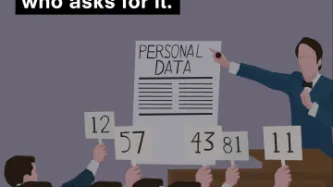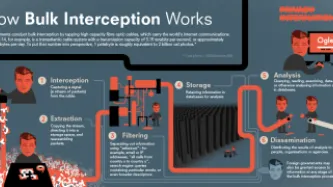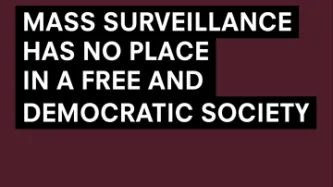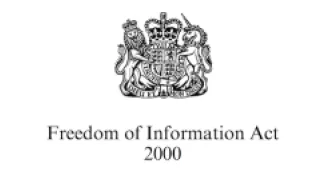Search
Content type: Long Read
As our four year battle against the UK government’s extraordinarily broad and intrusive hacking powers goes to the Supreme Court, we are launching a new fundraising appeal in partnership with CrowdJustice.
We are seeking to raise £5k towards our costs and need your help. If we lose, the court may order us to pay for the government’s very expensive army of lawyers. Any donation you make, large or small, will help us both pursue this important case and protect the future ability of…
Content type: News & Analysis
Our team wanted to see how data companies that are not used to being in the public spotlight would respond to people exercising their data rights. You have the right under the EU General Data Protection Regulation ("GDPR") to demand that companies operating in the European Union (either because they are based here or target their products or services to individuals in the EU) delete your data within one month. We wrote to seven companies and requested that they delete our data, and we've made…
Content type: Advocacy
Today, Privacy International has filed complaints against seven data brokers (Acxiom, Oracle), ad-tech companies (Criteo, Quantcast, Tapad), and credit referencing agencies (Equifax, Experian) with data protection authorities in France, Ireland, and the UK.
It’s been more than five months since the EU’s General Data Protection Regulation (GDPR) came into effect. Fundamentally, the GDPR strengthens rights of individuals with regard to the protection of their data, imposes more…
Content type: Long Read
Photo credit: Pixabay
This piece was originally published in iNews
It seems that you can’t go anywhere online at the moment without being reassured that ‘we respect your privacy’ and being directed to a 2,000-word privacy policy. You probably just click ‘got it, thanks’ because who has the luxury to stop and think about what their ‘privacy’ actually means?
But privacy is something that starts becoming far less abstract when you can see how it is being threatened and undermined, every day and…
Content type: Long Read
This piece was originally published in Just Security.
Earlier this month, the European Court of Human Rights issued a major judgment in three consolidated cases challenging the U.K. government’s mass interception program, which was first revealed by Edward Snowden in 2013. That judgment finds notable deficiencies in the legal framework governing mass interception, rendering the program unlawful under Articles 8 and 10 of the European Convention on Human Rights (ECHR), which protect the rights…
Content type: Long Read
Written jointly by Privacy International and the American Civil Liberties Union (ACLU).
In a landmark decision earlier this month, the European Court of Human Rights ruled that one of the mass surveillance programs revealed by Edward Snowden violates the rights to privacy and freedom of expression. While the case challenges the U.K. government’s mass interception of internet traffic transiting its borders, the court’s judgment has broader implications for mass spying programs in Europe and…
Content type: Press release
Thames House, Offices of MI5. Photo Credit: Wikimedia Commons
MI5 collected Privacy International’s private data and examined it
GCHQ, MI5, and MI6 unlawfully collected data relating to UK charity Privacy International
Privacy International has written to the UK's Home Secretary demanding action against spy agencies
Disclosures come less than a fortnight after UK laws on mass surveillance ruled unlawful at European Court of Human Rights
The UK's domestic-facing intelligence…
Content type: Long Read
Yesterday, the European Court of Human Rights issued its judgement in Big Brother Watch & Others V. the UK. Below, we answer some of the main questions relating to the case.
What's the ruling all about?
In a nutshell, one of the world's most important courts, the European Court of Human Rights, yesterday found that certain UK laws about how intelligence agencies can spy on our internet communications breach our human rights. These surveillance laws have meant that the UK intelligence…
Content type: News & Analysis
Today was a big day for the privacy of millions of people. The European Court of Human Rights has today ruled that UK laws enabling mass interception of our communications violate the rights to privacy and freedom of expression. This finding is an important victory for human rights and the rule of law.
The judges found that:
The UK’s historical bulk interception regime violated the right to privacy protected by Article 8 of the European Convention on Human Rights (ECHR) and to free…
Content type: Long Read
The European Court of Human Rights ruled today that the UK government's mass interception program violates the rights to privacy and freedom of expression. The Court held that the program "is incapable of keeping the 'interference' to what is 'necessary in a democratic society'". This finding is an important victory for human rights and the rule of law. Below, we break down the key parts of the decision.
The Court's ruling comes after a five-year battle against two UK mass surveillance…
Content type: Press release
The European Court of Human Rights has today ruled that UK laws enabling mass surveillance violate the rights to privacy and freedom of expression.
Judges found that:
The UK’s historical bulk interception regime violated the right to privacy protected by Article 8 of the European Convention on Human Rights (ECHR) and to free expression, protected by Article 10.
The interception of communications data is as serious a breach of privacy as the interception of content, meaning the UK…
Content type: News & Analysis
Create Commons Photo Credit: Source
Privacy International has achieved an important victory for government transparency and information access rights. This victory stems from a long-running battle with the government to obtain information about the UK police’s purchase and use of IMSI catchers. The Information Commissioner’s Office (ICO) recently issued a series of decisions, which agree with Privacy International that police forces cannot rely on a position of “neither confirm nor deny” (NCND…
Content type: Press release
We found this image here.
The National Police Chiefs’ Council (NPCC) will no longer be able to operate in secret after human rights campaign organisations Liberty and Privacy International demanded it be subject to Freedom of Information laws.
The Government has now informed the organisations that it has started a process to designate the law enforcement policy-making body as a public authority subject to the Freedom of Information Act (FOIA) – meaning it will be open to public scrutiny.…
Content type: Press release
We found this image here
The Investigatory Powers Tribunal (IPT) today held that, for a sustained period, successive Foreign Secretaries wrongly gave GCHQ unfettered discretion to collect vast quantities of personal customer information from telecommunications companies.
The judgment exposes:
· the error-ridden and inconsistent evidence provided by GCHQ throughout the case;
· the willingness of telecommunications companies to secretly hand over customer data on the basis of mere verbal…
Content type: News & Analysis
While the worlds’ attention, the world’s humour, including a dedicated playlist of 89 songs on Spotify, were on the coming into force of EU’s General Data Protection Regulation (GDPR) on 25th May, the UK’s Data Protection Act 2018 (DPA 2018) that received Royal Assent only two days previously had barely received a few column inches in the mainstream press.
However, the substance of the debates in parliament during the passage of this Act has received wide…
Content type: Press release
Privacy International (PI) has today urged England Manager Gareth Southgate to bolster his defence ahead of the World Cup in Russia, which kicks off next Thursday. PI sent Southgate an anti-surveillance 'Faraday cage' phone pouch and a briefing on his vulnerability to potential spying by rival football managers and foreign governments intent on giving their team a competitive advantage. If rival governments routinely hack and intercept each other's communications, what's stopping rival teams'…
Content type: Press release
On the five year anniversary of NSA whistleblower Edward Snowden leaking a massive trove of classified information that has since transformed our understanding of government mass surveillance, Dr Gus Hosein, Executive Director of Privacy International said:
“Is it enough for your government to tell you ‘we’re keeping you safe, but we’re not going to tell you how’? Edward Snowden asked himself this profoundly important question five years ago. We’re thankful he did.
His decision to expose the…
Content type: Press release
Today, as the Data Protection Bill reaches its final stages, Privacy International has written to the leaders of the main UK political parties asking for public commitment to not use the exemption provided in the Bill to target voters - both online and offline - in all local and national forthcoming elections or by-elections.
Privacy International has long been concerned about the exploitation of peoples’ data and the opaque data ecosystem, and the impact of such practices on the democratic…
Content type: News & Analysis
Following on from the publication of our ‘Digital Stop and Search’ report last month, into the use of intrusive technology that enables officers to download all of the data stored on our mobile phones, we are pleased that Scotland's Justice Sub-Committee on Policing have been scrutinising Police Scotland over their use of the technology.
During the hearing by Scotland's Justice Sub-Committee on Policing on 10th May John Finnie MSP stated he personally did not feel reassured, after grilling…
Content type: Advocacy
A new Privacy International report based on an international collaborative investigation carried out by 40 NGOs in 42 countries has found alarming weaknesses in the oversight arrangements that are supposed to govern the sharing of intelligence between state intelligence agencies, including in the UK. Privacy International urges governments to enact urgent reforms and improve public understanding about the scope of intelligence sharing and the safeguards and oversight currently in place.
Content type: News & Analysis
This op-ed originally appeared in the Huffington Post.
As technologies used by the police race ahead of outdated legislation, we are left vulnerable to potential for misuse and abuse of our data
The vast quantities of data we generate every minute of the day and how it can be exploited is challenging democratic and societal norms. The use by UK police forces of technologies that provide access to data on our phones, which document everything we do, everywhere we go, everyone we interact with…
Content type: Press release
Key points:
Privacy International have today published a report entitled 'Digital Stop and search: how the UK police can secretly download everything from your mobile phone', based on Freedom of Information requests to 47 police forces across the UK about their use of 'mobile phone extraction' technologies, which enable them to download all the content and data from a mobile phone.
Police forces across the UK are secretly downloading data from the smartphones of people across…
Content type: Report
The ‘Digital stop and search’ report examines the use of ‘mobile phone extraction’ tools by the UK police, enabling them to download all of the content and data from people’s phones.
Privacy International have exposed a potentially unlawful regime operating with UK police forces, who are confused about the legal basis for the technology they are using. The police are acting without clear safeguards for the public, and no independent oversight to identify abuse and misuse of sensitive personal…
Content type: Long Read
In December 2017, Privacy International published an investigation into the use of data and microtargeting during the 2017 Kenyan elections. Cambridge Analytica was one of the companies that featured as part of our investigation.
Due to the recent reporting on Cambridge Analytica and Facebook, we have seen renewed interest in this issue and our investigation. Recently in March of 2018, Channel 4 News featured a report on micro targeting during the 2017 Kenyan Presidential Elections, and the…
Content type: Press release
Privacy International today received an email from Saul Olivares, Sales and Marketing Director of Creativity Software, in response to the letter we sent to Creativity CEO Richard Lee yesterday.
Mr Olivares directed PI to an attached statement, in which Creativity stated that it was:
…proud to be a supplier of world class technology to MTN, in Iran and other countries. MTN is a company with the vision of being the leading telecommunications provider in emerging markets, with an avowed mission…
Content type: Press release
The Case
Privacy International v Secretary of State for Foreign and Commonwealth Affairs et al. (Bulk Personal Datasets & Bulk Communications Data challenge)
Date: 5-9 June 2017
Time: from 10:00 onwards
Location: Royal Courts of Justice, The Strand, London WC2A 2LL United Kingdom
Hearing overview
Next week’s hearing follows the Investigatory Powers Tribunal’s earlier judgment in October 2016, which ruled that three issues are to be determined:
…
Content type: News & Analysis
The recent announcement by the Minister for Justice that serious and organised crime will receive legislative attention from the Government and the Oireachtas is most welcome. However, the stated means of achieving this are deeply concerning for the Irish public and larger digital economy. The statements indicate that the Government intends to follow the British model of surveillance where Irish companies can be compelled to betray their users. Why would any user engage with a…
Content type: News & Analysis
This post was written by Chair Emeritus of PI’s Board of Trustees, Anna Fielder.
The UK Data Protection Bill is currently making its way through the genteel debates of the House of Lords. We at Privacy International welcome its stated intent to provide a holistic regime for the protection of personal information and to set the “gold standard on data protection”. To make that promise a reality, one of the commitments in this government’s ‘statement of intent’ was to enhance…

















